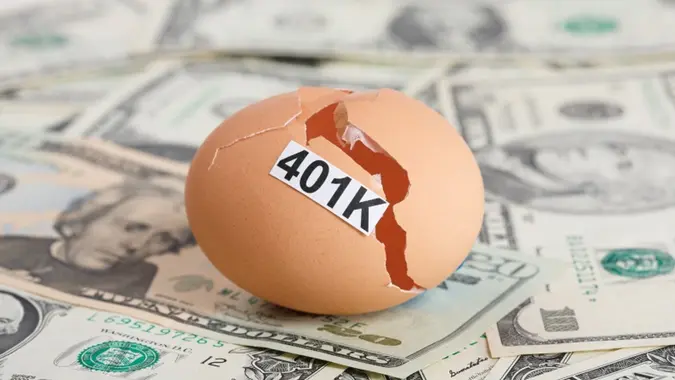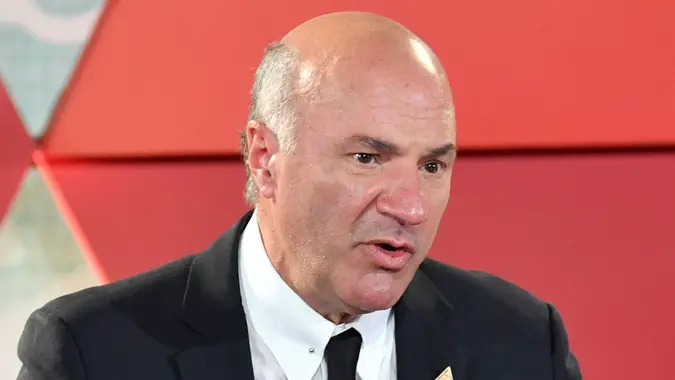There’s $1.7T in Unclaimed 401(k) Funds — How To Find Out If Any of It Is Yours?

Commitment to Our Readers
GOBankingRates' editorial team is committed to bringing you unbiased reviews and information. We use data-driven methodologies to evaluate financial products and services - our reviews and ratings are not influenced by advertisers. You can read more about our editorial guidelines and our products and services review methodology.

20 Years
Helping You Live Richer

Reviewed
by Experts

Trusted by
Millions of Readers
If you changed jobs anytime in the past — as most Americans have, multiple times — you might have left some money behind in your 401(k) plan. Money in 401(k) plans doesn’t automatically follow a person from job to job. If you want to keep your money, you’ll have to actively move it. But many Americans don’t understand what they have to do to keep their money or even if they’re actually entitled to it.
As a result, according to figures from financial services firm Capitalize, $1.7 trillion or more currently sits in lost or forgotten 401(k) plans, an incredible 25% of all money held in 401(k) accounts. Spread out over 29 million accounts, that puts the average unclaimed balance at $56,616. How could that be? And how could you find out if any of that money belongs to you? Read on to find out.
How Money Gets Left Behind in 401(k) Plans
Changing jobs can be stressful, even if it’s by your own choice. In addition to the stress of transitioning to a new work culture in a new environment, you may have to relocate, potentially putting your kids in a new school or buying or renting a new home. Even without all that additional stress, dealing with your former 401(k) plan can be among the last things on your mind when you take on a new job.
Even if you know you left some money behind, you may feel like it’s too much of a hassle to bring over a relatively small sum of money — or you may even think that it’s no longer your money once you leave a company. The bottom line is that there are many reasons why some Americans leave 401(k) money behind.
How Balances Could Be So Large
While some Americans may leave behind account values of $50,000, $100,000 or more, the truth is that most workers who “forget” or leave behind 401(k) money actually leave only a few thousand behind them. But over a period of years or decades, those small amounts — typically invested in stocks — can compound fairly rapidly.
Imagine a scenario in which you leave behind $9,000 in a 401(k) plan that’s invested in the S&P 500 index. According to Nasdaq, from 2010 to 2025, the S&P 500 returned an average of 13.8% per year. If you left $9,000 in a 401(k) plan over those 15 years, it would have grown to $70,485. What may have in your mind been a relatively small sum of $9,000 would now be worth almost eight times as much money.
What You Can Do To Recover Any Lost Money
Fortunately, there are some concrete steps you can take to see if you have any lost 401(k) money. Here’s a list of resources you can use in your quest, according to USA Today:
- National registry of unclaimed retirement benefits: Simply enter your Social Security number to begin your search.
- Retirement savings lost and found database: This is a Department of Labor website that is slowly expanding its reach to find lost consumer assets.
- Missing money: This database covers a wide variety of “missing” assets in both the United States and Canada, including 401(k) and retirement plan accounts.
Beyond checking websites for missing money, you can be proactive and do your own research. See if you have any old pay stubs or account statements to jog your memory about any past contributions you may have made. Have the information on hand when you contact the HR departments of your prior employers to help with the search.
Understand that if your prior 401(k) plan had less than $1,000, it’s likely that your plan administrator simply liquidated the account on your behalf and mailed you a check. It’s possible that you cashed the check long ago and simply forgot about it. However, it also may be the case that the check was sent to an improper address. In either case, it’s worth speaking with your prior plan administrator to track down the final disposition of that money.
 Written by
Written by  Edited by
Edited by 

























